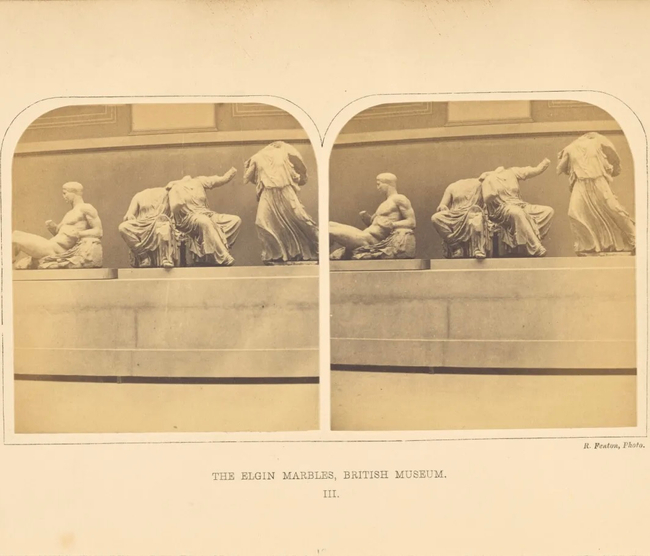As UK Law Grants New Powers to Galleries and Museums in England and Wales, Prime Minister Liz Truss Takes Stance Against Return of Parthenon Marbles
A provision of the new Charities Act signaled a significant shift in the legal landscape for museums and restitution, yet newly appointed UK Prime Minister Liz Truss does not support a plan to share ownership of the Parthenon Marbles with Greece.
Despite hope that a provision in the UK’s 2022 Charities Act would lead to new practices and potentially the return of the of the Elgin Marbles to Greece, UK Prime Minister Liz Truss recently stated “I don’t support that”, when questioned about a June 2022 plan proposal by former UK chancellor and British Museum Chair, George Osborne, that would see the loan of the contested marbles to Greece.
In many countries, including the United Kingdom, numerous institutions have been prevented from returning art and artifacts with cultural significance, pointing to statutes barring the restitution of items. Most notable is the UK’s refusal to return the Parthenon Marbles to Greece despite its pleas, citing constraints imposed by the British Museum Act 1963, according to Ilaria Bortot, as per Lord Eligin’s royal decree or “firman”.
The statement from Truss directly conflicts with The Charities Act, set to come into play this Fall, which had many hopeful that the change in law would allow national institutions to be guided by their ethical sensibilities, rather than being impeded by legal constraints. Even institutional leaders had expressed a desire to repatriate the marbles in some form, and now consider the refusal to be counterintuitive to modern ethical considerations. Deputy director of London’s British Museum, Jonathan Williams, for instance had “hoped to change the temperature of the debate,” over the marbles, calling for “an active ‘Parthenon partnership’ with our friends and colleagues in Greece.”
As George Suttles writes:
“Cultural institutions are important actors in the promotion of cultural understanding, dialogue and diversity, and the transmission of culture and values to future generations. This is a noble and lofty calling, and for boards of trustees stewarding these institutional missions, it is time to consider ethical governance frameworks that serve as a lens and litmus test for any mission-related activities.”
Trustees of major institutions may soon be able to do just that, despite Truss’ seemingly oppositional views. Institutions may begin acting with more certainty in these matters with ethics at the front of consideration on restitution, as significant changes to charity law of England and Wales were passed in February by Parliament in the recent Charities Act 2022. The changes are expected to come into effect beginning within the next few months.
As many art museums and cultural institutions operate as charities, charity law plays a crucial role in the operations of art organizations and museums. The Charities Act 2022 is significant as it essentially grants that charity payments or returns regime less burdensome. As Devonshire’s reports, “Relatively modest ex gratia payments made by a charity will be allowed without needing the permission of the Commission. Ex gratia payments are payments to which charity trustees feel morally obliged to make but have no legal power to do so.” Therefore, museum trustees will now have the ability to make ex gratia transfers (depending upon the institution’s gross income) for certain items and property of less value; they will be able to do so for high-value items with authorization from the Charity Commission, if they are able to show clear and impartial evidence of a moral obligation.
These ex-gratia payments or transactions are related to repatriation, where a museum or other charitable institution may agree to return an item to its country of origin on “moral” grounds. The moral assessment may be best guided by the Arts Council England document Restitution and Repatriation: A Practical Guide for Museums in England, which outlines the consideration of four main factors. These factors include the consideration of the significance of the object, how the object was removed from its place of origin, how the institution has engaged with the object, and the position of the person raising the claim.
According to Alexander Herman, author, scholar, and the Director of the Institute of Art and Law:
“Critically, the new Act will allow authorization to be obtained by trustees of charities established by legislation that would otherwise prohibit the disposal of property – e.g. national institutions.”
These changes and new laws will also likely spur long-awaited policy changes to museums’ guidelines and bylaws. For example, The British Museum’s current policy on deaccessioning works prevents trustees from returning objects unless they are a “duplicate of another item in the collection…can be disposed of without detriment to the interest of public or scholars” or if they have “become useless for the purposes of the Museum by reason of damage, physical deterioration, or infestation by destructive organisms”.
Other changes to law may come soon that would further push for the return of the Elgin Marbles as well as other art and artifacts. Lord Vaisey, former minister for culture, recently gained a house of Lords debate set for Thursday of this week, where he will call for the review of the 1993 Heritage Act, which also has preventative power for many national museums to deaccession objects. Vaisey is one of the most recent Conservatives to advocate the return of the marbles, stating that he is now “strongly of the view” that the marbles should be returned to Greece and that his own stance had changed since his time as arts minister from 2010 – 2016. Considering the evolving legal landscape, Vaisey’s upcoming debate, and an announcement from the prime minister of Greece, Kyria Mitsotakis, that he plans to discuss the return of the Parthenon Marbles later this year on a visit to Britain, some wonder if Liz Truss will further consider their return as well.
